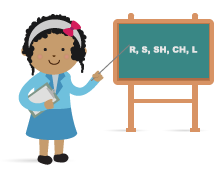
Down syndrome (DS) is caused by the presence of an extra copy of chromosome 21. Children with Down syndrome have a severe delay in cognitive abilities, physical growth, and often exhibit unique facial and physical characteristics. Language skills are greatly impacted and children with DS commonly have a speech delay as well as difficulty understanding and expressing speech. Early intervention and individualized speech therapy can help target speech errors, increase intelligibility, and encourage literacy skills.
It is recommended that all women who are pregnant be screened for Down syndrome. Many non-invasive prenatal screenings can test to see if the developing fetus is disposed to DS. Down syndrome can also be diagnosed at birth after checking the child for abnormalities.
Down syndrome characteristics fall into physical and mental categories. Physical symptoms include: a smaller than normal growth rate, low muscle tone, a flattened nose and broad head, and a chin that is smaller than normal. Mentally, children with DS may suffer from: intellectual disabilities, such as a lower IQ, fine motor skill delay due to low muscle tone, and speech delay.
DS causes delay in vocalization and language acquisition causing some children to not start speaking until 24-36 months. The speech delay and associated problems generally stem from poor muscle tone (called “hypotonia”) in the area around the mouth making it hard to pronounce the sounds correctly. Hypotonia also leads to feeding and swallowing problems. Children with DS are often born with narrow Eustachian tubes in the middle ear, which can make fluid build-up. This may affect a child’s ability to hear clearly, leading to language processing problems and delayed ability to understand spoken language.
There is no known cure for a person with Down syndrome. There are ways to alleviate symptoms and give high quality of life, such as early childhood intervention, treating medical symptoms, and proper education or vocational training.
For speech problems, working from an early age with a speech language pathologist is the best way to help train proper speech. If the child suffers from poor auditory processing, undergoing surgery to insert ear tubes or using a hearing aid can greatly aid a child’s understanding of sounds and language. Speech therapists may use collections of tools (like Picture Exchange Communication System) or sign language to help aid the process of communication.
Tactile prompts have been used to encourage children with articulation disorders to improve fluency and speech production. Speech Buddies have sometimes been shown to help children with Down syndrome and are being evaluated further.
Articulation Disorder, Apraxia of Speech, Autism, Cerebral Palsy, Cleft Palate, Fragile X Syndrome, Language Disorder, Speech Delay, Stuttering
References:
http://www.speechbuddy.com/blog/speech-therapy-techniques/speech-difficulties-in-down-syndrome/

Please contact us for immediate help with your request.
![]() 1-866-247-8030
1-866-247-8030
![]() info@speechbuddies.com
info@speechbuddies.com
Outside of business hours? You will be contacted as soon as we are open.
To choose a new speech therapist, please contact us.
![]() 1-866-247-8030
1-866-247-8030
![]() info@speechbuddies.com
info@speechbuddies.com
Outside of business hours? You will be contacted as soon as we are open.
You can reschedule your appointments anytime. We ask that you give us at least 24 hours notice to avoid any unnecessary fees or complications. You will not be charged for any of your sessions until the day of that appointment.
Your speech therapist likely gave you a recommended treatment plan in your first session. If not, make your best guess – you can always modify your package later.
Your message has been sent. or close this window to continue.
Your discount code will be sent to your email shortly.
 I am a parent
I am a parent
 I am a Speech Therapist
I am a Speech Therapist